MOSCOW, April 30 (RAPSI) – Banks are obliged to grant grace periods to individual borrowers whose finances were gravely affected by the measures introduced to combat the coronavirus outbreak, Russia’s Supreme Court materials on specifics of proceedings amid the pandemic read.
The grace period is defined as suspension of obligations of borrowers, according to the Court.
However, the Court said the number of such cases is to be limited citing the changes to the federal law on the national Central Bank. Grace periods are not to be granted if loans are above the caps set forth by Russia’s government; a borrower’s income declines less than 30% in comparison with the figures registered in the respective period of the preceding year; or a grace period has been already granted.
Borrowers, the Supreme Court observes, may be granted a six months-long grace period on the basis of an application submitted not later than September 30, 2020.
The grace period is not to begin more than 14 days prior to the date of submission of a respective application to a bank, or one month prior to the date of submission of an application if it concerns mortgage. In cases concerning consumer credits or credit cards, grace periods are not to begin on any date earlier than that of the submission of the application.
Banks are not obliged, but have the right to request and examine the documents confirming the decline in a borrower’s income, the Supreme Court clarifies.
Grace periods, according to the Court, are not to bar recognition of the fact that obligations have not been met because of force majeure.



